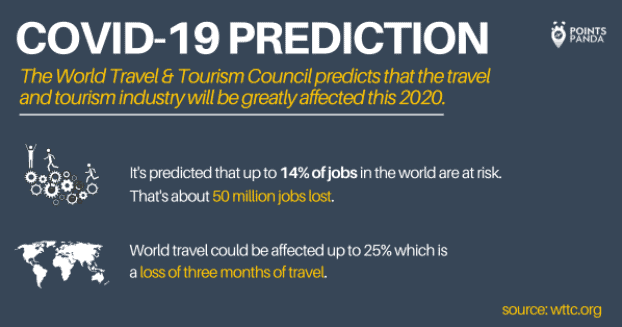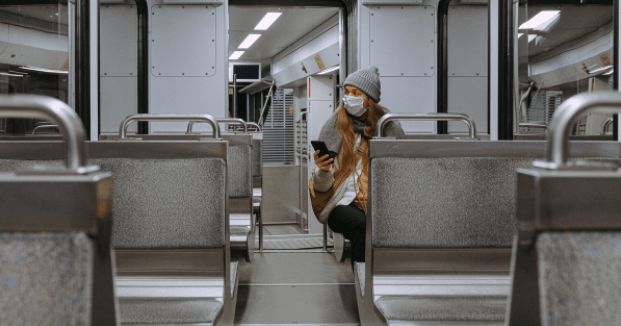MileValue is part of an affiliate sales network and receives compensation for sending traffic to partner sites, such as CreditCards.com. This compensation may impact how and where links appear on this site. This site does not include all financial companies or all available financial offers. Terms apply to American Express benefits and offers. Enrollment may be required for select American Express benefits and offers. Visit americanexpress.com to learn more.
Note: Some of the offers mentioned below may have changed or are no longer be available. You can view current offers here.
Today we’re featuring a guest post from our friend and colleague, Freddy Lanksy, of Points Panda. He’s sharing his opinion on the impact COVID-19 has had on the travel industry, and how travel agencies are adapting.
The COVID-19 pandemic dealt a big blow to the world economy. Since the first outbreak happened in the U.S. back in January, a lot of businesses have halted their operations to prevent the spread of the deadly virus.
This is bad news for all businesses involved in travel, whether it’s hotels, tours, travel agents, airline companies, or even small private tour guides. Asia is expected to be the worst affected by this pandemic.
Coronavirus Travel Predictions
It’s definitely the travel and tourism industry that took the biggest blow. The World Travel and Tourism Council has warned that at least three months of global travel would be affected which could result in a loss of at least 50 million jobs.
Remember that 10.3% of the global GDP belongs to the tourism industry, so it’s that serious.
Regardless if there is a vaccine or none released to the general public, it will probably take up to ten months for the entire industry to go back to normal. That’s just an estimate as you also need to take into account each country’s restrictive measures, such as Europe’s plans on extending the ban on all non-essential travel up until July.

The WTTC also recommends that countries should ease on visa restrictions and cut down on travel taxes once the pandemic is under control.
Below are some of WTTC’s recommendations, especially to countries that have strict policies.
- Enhance Travel Facilitation – Visas should be simplified–or removed if possible–to encourage people to travel. Countries should also invest in technology that makes travel smooth and secure. These recommendations will reduce travel cost and speed up processing periods.
- Ease Fiscal Policies – Hospitality taxes, duties, and other unnecessary fees imposed on travelers should be removed or lowered.
- Remove Barriers – Barriers that seem unnecessary should be removed at ports and airports. It’s also recommended to provide flexible working visas within the travel industry to help kickstart the labor force again.
- Support Destinations – Tourist destinations should receive support from local government or private organizations with regards to promotion and marketing once they are ready to accept visitors.
- Provide Incentives – Giving incentives to both travelers and businesses will encourage economic continuity in the industry.
Read More: What Will Travel After Coronavirus Look Like?

How The Coronavirus Affected The Travel Industry
The coronavirus pandemic has drastically changed the way the travel industry operates as a whole. However, sectors of the industry are also affected differently.
Aviation
Statistics from IATA show that the aviation industry is expected to have an annual loss of $113-252 billion. Supposedly, there should be a 4% increase in the industry’s annual revenue projection, however, it just plummeted to a 13%-30% decrease.
It’s not possible for the aviation industry to just wait out the pandemic without being affected because its revenue generation is heavily dependent on traffic. With travel bans being imposed and flights being canceled, it’s not going to get better anytime soon.
That being said, some countries are striving hard to keep their aviation industry alive. Take the U.S. for instance: many are limiting physical contact and encouraging people to practice social distancing. Airports and airline companies are also implementing enhanced cleaning procedures that are in accordance with the guidelines from the Centers for Disease Control and Prevention (CDC).
Read More: Handling Coronavirus Flight Cancellations
Tours and Activities
Arival states that the tours and activities sector consists of 1 million operators and is valued at a whopping $254 billion for the 2019 calendar year.
Now, it’s the small businesses in this industry that are going to be hit the most. Why? In 2019 alone, 86% of these tour operators earned an annual income of less than $250k. Imagine how that will turn if the coronavirus still won’t go away.
Hotels and Stays
Trip.com projected a drastic 50% decline in their revenue for the first quarter of 2020. They mentioned that millions of bookings were canceled especially during the Chinese New Year.
The occupancy level in the U.S was above 50% back in March but it seems like it’s going to go down to as low as 10% and follow the downward trend set by China and Italy.
Another example is Marriott which reported a decline in their company revenue of up to 60%. They’ve also closed around 7,300 hotels globally, with 1,000 of those hotels located in the U.S.
Travel Agencies
Travel agencies have also been affected by the coronavirus pandemic. Most have adjusted to the new norm by offering new services such as trip cancellations, coronavirus-specific travel assistance, and customized trips that are safe for a pandemic. Here are a few examples.
MileValue’s Flight Change & Cancelation Assistance
Sarah Page from MileValue realized that many of her clients were having a hard time dealing with trip cancelations and rebookings. This is why she added a new service to her business that specifically caters to these issues.
The flight assistance service costs $75 to change or cancel a roundtrip flight and $40 for every additional segment.
Read More: JetBlue Coronavirus Flight Cancelations and Schedule Changes
Points Panda’s Coronavirus Travel Assistance
At Points Panda we’ve also made changes to our existing travel hacking concierge. We recently added the Coronavirus Travel Assistance Concierge which focuses on helping clients adjust to the new norm of travel and travel hacking.
Members from my travel hacking concierge were constantly asking me pandemic related questions, so I took data and feedback from them to create a Coronavirus concierge. It allows people to get back flying and on the road safely by having access to a team of travel pros looking out for them.
This is how the service works: People send me the dates they plan on traveling and we research all the pandemic related travel issues for them such as travel restrictions, virus risk, and what attractions will be open and closed when they arrive.
The company offers two levels of service, Consulting and Concierge, which cost an annual flat rate of $695 and $1,295 respectively. You’ll get unlimited assistance for all pandemic-related travel issues that you encounter.
Bell & Bly Travel’s Customized Trip Planning
This bespoke high-end travel agency also started to offer customized plans for their clients when the pandemic broke out. The service shifted from offering foreign travel assistance to getting people to experience travel within their local areas.
Bell & Bly Travel CEO Sarah Groen said, “When COVID-19 got serious, we built customized “plans” for our clients to experience their destinations at home – from recipes to curated Netflix shows and virtual museum walk-throughs.
Now our clients are wanting to get out but in a safe way. We’ve built a list of boutique hotel buyouts, private villas with quarantined/tested staff, and gotten really smart on US destinations. We also added a luxury RV partnership and ultra-exclusive glamping with a full staff.”
Everyone Is Adapting To The New Norm
Reports say that the pandemic will probably last for two years. We can’t really say how long it will affect travel but one thing is for sure – everyone is adapting.
If you find yourself traveling within the next few months, expect physical distancing, fewer passengers, and enhanced disinfecting protocols laid out by establishments.
Just getting started in the world of points and miles? The Chase Sapphire Preferred is the best card for you to start with.
With a bonus of 60,000 points after $4,000 spend in the first 3 months, 5x points on travel booked through the Chase Travel Portal and 3x points on restaurants, streaming services, and online groceries (excluding Target, Walmart, and wholesale clubs), this card truly cannot be beat for getting started!
Editorial Disclaimer: The editorial content is not provided or commissioned by the credit card issuers. Opinions expressed here are the author’s alone, not those of the credit card issuers, and have not been reviewed, approved or otherwise endorsed by the credit card issuers.
The comments section below is not provided or commissioned by the bank advertiser. Responses have not been reviewed, approved, or otherwise endorsed by the bank advertiser. It is not the bank advertiser’s responsibility to ensure all questions are answered.


